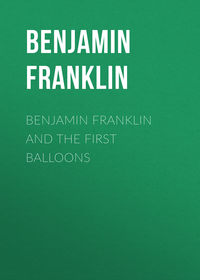![Memoirs of Benjamin Franklin; Written by Himself. [Vol. 2 of 2]](/covers_330/24858395.jpg) полная версия
полная версияMemoirs of Benjamin Franklin; Written by Himself. [Vol. 2 of 2]
To speak, though sure, with seeming diffidence, is therefore a good one; and if I had ever seen in your conversation the least deviation from it, I should earnestly recommend it to your observation. I am, &c.,
B. Franklin.To M. DubourgOBSERVATIONS ON THE PREVAILING DOCTRINES OF LIFE AND DEATH* * Your observations on the causes of death, and the experiments which you propose for recalling to life those who appear to be killed by lightning, demonstrate equally your sagacity and your humanity. It appears that the doctrines of life and death, in general, are yet but little understood.
A toad buried in sand will live, it is said, till the sand becomes petrified: and then, being enclosed in the stone, it may still live for we know not how many ages. The facts which are cited in support of this opinion are too numerous and too circumstantial not to deserve a certain degree of credit. As we are accustomed to see all the animals with which we are acquainted eat and drink, it appears to us difficult to conceive how a toad can be supported in such a dungeon: but if we reflect that the necessity of nourishment, which animals experience in their ordinary state, proceeds from the continual waste of their substance by perspiration, it will appear less incredible that some animals, in a torpid state, perspiring less because they use no exercise, should have less need of aliment; and that others, which are covered with scales or shells which stop perspiration, such as land and sea turtles, serpents, and some species of fish, should be able to subsist a considerable time without any nourishment whatever. A plant, with its flowers, fades and dies immediately if exposed to the air without having its root immersed in a humid soil, from which it may draw a sufficient quantity of moisture to supply that which exhales from its substance and is carried off continually by the air. Perhaps, however, if it were buried in quicksilver, it might preserve, for a considerable space of time, its vegetable life, its smell, and colour. If this be the case, it might prove a commodious method of transporting from distant countries those delicate plants which are unable to sustain the inclemency of the weather at sea, and which require particular care and attention. I have seen an instance of common flies preserved in a manner somewhat similar. They had been drowned in Madeira wine, apparently about the time when it was bottled in Virginia to be sent hither (to London). At the opening of one of the bottles, at the house of a friend where I then was, three drowned flies fell into the first glass that was filled. Having heard it remarked that drowned flies were capable of being revived by the rays of the sun, I proposed making the experiment upon these: they were therefore exposed to the sun upon a sieve, which had been employed to strain them out of the wine. In less than three hours, two of them began by degrees to recover life. They commenced by some convulsive motions of the thighs, and at length they raised themselves upon their legs, wiped their eyes with their fore-feet, beat and brushed their wings with their hind-feet, and soon after began to fly, finding themselves in Old England, without knowing how they came thither. The third continued lifeless till sunset, when, losing all hopes of him, he was thrown away.
I wish it were possible, from this instance, to invent a method of embalming drowned persons, in such a manner that they may be recalled to life at any period, however distant; for, having a very ardent desire to see and observe the state of America a hundred years hence, I should prefer to any ordinary death the being immersed in a cask of Madeira wine, with a few friends, till that time, to be then recalled to life by the solar warmth of my dear country! But since, in all probability, we live in an age too early and too near the infancy of science to hope to see such an art brought in our time to its perfection, I must, for the present, content myself with the treat which you are so kind as to promise me, of the resuscitation of a fowl or a turkey-cock.
B. Franklin.LORD BROUGHAM'S PORTRAIT OF DR. FRANKLINThe following admirable sketch of the character of Franklin is from a new work by Lord Brougham, recently published in London, entitled "Statesmen in the time of George III." It has not been published in this country:
"One of the most remarkable men, certainly, of our times as a politician, or of any age as a philosopher, was Franklin, who also stands alone in combining together these two characters, the greatest that man can sustain, and in this, that having borne the first part in enlarging science by one of the greatest discoveries ever made, he bore the second part in founding one of the greatest empires.
"In this truly great man everything seemed to concur that goes towards the constitution of exalted merit. First, he was the architect of his own fortune. Born in the humblest station, he raised himself, by his talents and his industry, first, to the place in society which may be attained with the help only of ordinary abilities, great application, and good luck; but next, to the loftier heights which a daring and happy genius alone can scale; and the poor printer's boy, who at one period of his life had no covering to shelter his head from the dews of night, rent in twain the proud dominion of England, and lived to be the ambassador of a commonwealth which he had formed, at the court of the haughty monarchs of France who had been his allies.
"Then he had been tried by prosperity as well as adverse fortune, and had passed unhurt through the perils of both. No ordinary apprentice, no commonplace journeyman, ever laid the foundation of his independence in habits of industry and temperance more deep than he did, whose genius was afterward to rank him with the Galileos and the Newtons of the Old World. No patrician born to shine in courts, or assist at the councils of monarchs, ever bore his honours in a lofty station more easily, or was less spoiled by the enjoyment of them, than this common workman did when negotiating with royal representatives, or caressed by all the beauty and fashion of the most brilliant court in Europe.
"Again, he was self-taught in all he knew. His hours of study were stolen from those of sleep and of meals, or gained by some ingenious contrivance for reading while the work of his daily calling went on. Assisted by none of the helps which affluence tenders to the studies of the rich, he had to supply the place of tutors by redoubled diligence, and of commentaries by repeated perusal. Nay, the possession of books was to be obtained by copying what the art he himself exercised furnished easily to others.
"Next, the circumstances under which others succumb, he made to yield and bend to his own purposes; a successful leader of a revolt that ended in complete triumph, after appearing desperate for years; a great discoverer in philosophy, without the ordinary helps to knowledge; a writer famed for his chaste style, without a classical education; a skilful negotiator, though never bred to politics; ending as a favourite, nay, a pattern of fashion, when the guest of frivolous courts, the life which he had begun in garrets and in workshops.
"Lastly, combinations of faculties, in others deemed impossible, appeared easy and natural in him. The philosopher, delighting in speculation, was also eminently a man of action. Ingenious reasoning, refined and subtile consultation, were in him combined with prompt resolution and inflexible firmness of purpose. To a lively fancy he joined a learned, a deep reflection; his original and inventive genius stooped to the convenient alliance of the most ordinary prudence in every-day affairs; the mind that soared above the clouds, and was conversant with the loftiest of human contemplations, disdained not to make proverbs and feign parables for the guidance of apprenticed youths and servile maidens; and the hands that sketched a free constitution for a whole continent, or drew down the lightning from heaven, easily and cheerfully lent themselves to simplify the apparatus by which truths were to be illustrated or discoveries pursued.
"His discoveries were made with hardly any apparatus at all; and if, at any time, he had been led to employ instruments of a somewhat less ordinary description, he never seemed satisfied until he had, as it were, afterward translated the process, by resolving the problem with such simple machinery that you might say he had done it wholly unaided by apparatus. The experiments by which the identity of lightning and electricity was demonstrated, were made with a sheet of brown paper, a bit of twine, a silk thread, and an iron key.
"Upon the integrity of this man, whether in public or in private life, there rests no stain. Strictly honest and even scrupulously punctual in all his dealings, he preserved in the highest fortune that regularity which he had practised as well as inculcated in the lowest.
"In domestic life he was faultless, and in the intercourse of society delightful. There was a constant good humour and a playful wit, easy and of high relish, without any ambition to shine, the natural fruit of his lively fancy, his solid, natural good sense, and his cheerful temper, that gave his conversation an unspeakable charm, and alike suited every circle from the humblest to the most elevated. With all his strong opinions, so often solemnly declared, so imperishably recorded in his deeds, he retained a tolerance for those who differed with him which could not be surpassed in men whose principles hang so loosely about them as to be taken up for a convenient cloak, and laid down when found to impede their progress. In his family he was everything that worth, warm affections, and sound prudence could contribute, to make a man both useful and amiable, respected and beloved.
"In religion he would be reckoned by many a latitudinarian, yet it is certain that his mind was imbued with a deep sense of the Divine perfections, a constant impression of our accountable nature; and a lively hope of future enjoyment. Accordingly, his deathbed, the test of both faith and works, was easy and placid, resigned and devout, and indicated at once an unflinching retrospect of the past, and a comfortable assurance of the future.
"If we turn from the truly great man whom we have been contemplating to his celebrated contemporary in the Old World (Frederic the Great), who only affected the philosophy that Franklin possessed, and employed his talents for civil and military affairs in extinguishing that independence which Franklin's life was consecrated to establish, the contrast is marvellous indeed between the monarch and the printer."
1
What physicians call perspirable matter is that vapour which passes off from our bodies, from the lungs, and through the pores of the skin. The quantity of this is said to be five eighths of what we eat. – Author.
2
From a letter to Mr. Benjamin Vaughan, dated at Passy, July 26th, 1784.
3
Truth is brighter than light.
4
Oh virtue! the most certain ruin.
5
By divine right.
6
Citizen's Journal.
7
England in 1766
8
Ought we to punish a crime against society by a crime against nature?
9
The extreme severity of the laws prevents their execution. Where the punishment is excessive, it is frequently necessary to prefer impunity.
It is the exemption from punishment, and not its moderation which is the cause of crime.
10
Coveting what is the property of another.
11
This offer having been accepted by the late king of Prussia, a treaty of amity and commerce was concluded between that monarch and the United States, containing the following humane, philanthropic article, in the formation of which Dr. Franklin, as one of the American plenipotentiaries, was principally concerned, viz.,
"Art. XXIII. If war should arise between the two contracting parties, the merchants of either country then residing in the other shall be allowed to remain nine months to collect their debts and settle their affairs, and may depart freely, carrying off all their effects without molestation or hinderance; and all women and children, scholars of every faculty, cultivators of the earth, artisans, manufacturers, and fishermen, unarmed and inhabiting unfortified towns, villages, and places, and, in general, all others whose occupations are for the common subsistence and benefit of mankind, shall be allowed to continue their respective employments, and shall not be molested in their persons, nor shall their houses or goods be burned or otherwise destroyed, nor their fields wasted by the armed force of the enemy into whose power, by the events of war, they may happen to fall; but if anything is necessary to be taken from them for the use of such armed force, the same shall be paid for at a reasonable price. And all merchant and trading vessels employed in exchanging the products of different places, and thereby rendering the necessaries, conveniences, and comforts of human life more easy to be obtained, and more general, shall be allowed to pass free and unmolested; and neither of the contracting powers shall grant or issue any commission to any private armed vessels, empowering them to take or destroy such trading vessels or interrupt such commerce."
12
His sister married Mr. Edward Mecom, July 27, 1727.
13
Lord Kames had written to Dr. Franklin as early as 1765, when the first advices reached England of the disorders occasioned by the attempts to carry the stamp-act into execution; and he had written a second letter to him on the same subject in the beginning of 1767. This is a copy of Dr. Franklin's answer to these letters.
14
This letter was intercepted by the British ministry; Dr. F. had preserved a copy of it, which was afterward transmitted to Lord Kames; but the wisdom that composed and conveyed it was thrown away upon the men at that time in power.
15
There is not in the Jewish law any express prohibition against the use of horses: it is only enjoined that the kings should not multiply the breed, or carry on trade with Egypt for the purchase of horses. – Deut. xvii., 16. Solomon was the first of the kings of Judah who disregarded this ordinance. He had 40,000 stalls of horses which he brought out of Egypt. – 1 Kings iv., 26, and x., 28. From this time downward horses were in constant use in the Jewish armies. It is true that the country, from its rocky surface and unfertile soil, was extremely unfit for the maintenance of those animals. —Note by Lord Kames.
16
The American Philosophical Society was instituted in 1769, and was formed by the union of two societies which had formerly subsisted at Philadelphia, whose views and objects were of a similar nature. Its members were classed in the following committees:
1. Geography, Mathematics, Natural Philosophy, and Astronomy.
2. Medicine and Anatomy.
3. Natural History and Chymistry.
4. Trade and Commerce.
5. Mechanics and Architecture.
6. Husbandry and American Improvements.
Several volumes have been published of the transactions of this American Society, in which are many papers by Dr. Franklin. —Note by Lord Kames.
17
The Grand-duke of Russia, afterward the Emperor Paul I.
18
Dr. Franklin, Colonel Harrison, and Mr. Lynch, were at this time appointed by Congress (of which they were members) to confer on certain subjects with General Washington. The American army was then employed in blocking up General Howe in Boston; and it was during this visit that General Washington communicated the following memorable anecdote to Dr. Franklin, viz., "that there had been a time when his army had been so destitute of military stores as not to have powder enough in all its magazines to furnish more than five rounds per man for their small arms." Artillery were out of the question: they were fired now and then, only to show that they had them. Yet this secret was kept with so much address and good countenance from both armies, that General Washington was enabled effectually to continue the blockade.
19
With safety.
20
Without too great expense.
21
To be received in a suitable manner.
22
Antoine Court de Gebelin, born at Nismes in 1725, became a minister of a Protestant communion in the Cevennes, then at Lausanne: he quitted the clerical function for literature, at Paris, where he acquired so great a reputation as an antiquary and philosopher that he was appointed to attend one of the museums. His reputation suffered by his zeal in favour of animal magnetism. He died at Paris, May 13, 1784. His great work is entitled, "Monde Primitif, analysé et comparé avec le Monde Moderne," 9 tom. 4to. The excellence of his character may be appreciated from the fact, that, on quitting Switzerland, he voluntarily gave to his sister the principal part of his patrimony, reserving but little for himself, and relying for a maintenance upon the exercise of his talents.
23
A Vocabulary of the Language of one of the Indian Tribes in North America.
24
L'Academie des Inscriptions et Belles Letters.
25
Jonathan Shipley took his degrees at Christ Church, and in 1743 was made prebendary of Winchester. After travelling in 1745 with the Duke of Cumberland, he was promoted in 1749 to a canonry at Christ Church, became dean of Winchester in 1760, and 1769 bishop of St. Asaph. He was author of some elegant verses on the death of Queen Caroline, and published besides some poems and sermons, and died 1788. He was an ardent friend of American independence.
26
The country residence of the bishop.
27
Widow of the eminent anatomist of that name, and formerly Miss Stevenson, to whom several of Dr. Franklin's letters on Philosophical subjects are addressed.
28
Refers to Mrs. Hewson's mother.
29
Benjamin Franklin Bache, a grandson of Dr. Franklin, by his daughter Sarah; he was the first editor of the Aurora at Philadelphia: died of yellow fever in September, 1798.
30
See the Proposition about Privateering, annexed to letter to R. Oswald. January 14, 1783.
31
At Southampton, previous to Dr. Franklin's embarking for the United States.
32
Paley's Moral Philosophy.
33
John Hawkesworth, LL.D., author of the Adventurer, and compiler of the account of the Discoveries made in the South Seas by Captain Cook.
34
John Stanley, an eminent musician and composer, though he became blind at the age of two years.
35
Occasioned by his sending me some notes he had taken of what I had said to him in conversation on the Theory of the Earth. I wrote it to set him right in some points wherein he had mistaken my meaning. – B. F.
36
The paper of Mr. Mitchell, here referred to, was published afterward in the Philosophical Transactions of London.
37
See a paper on this subject, by the late ingenious Mr. Hadley, in the Philadelphia Transactions, wherein this hypothesis of explaining the tradewinds first appeared.
38
In Pennsylvania.


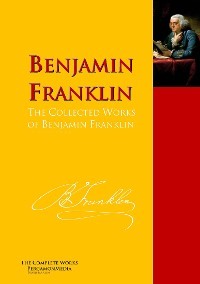
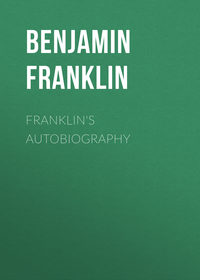
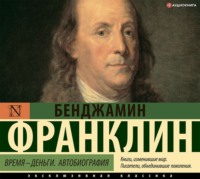
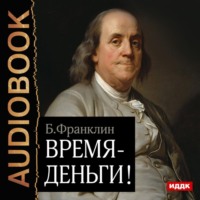
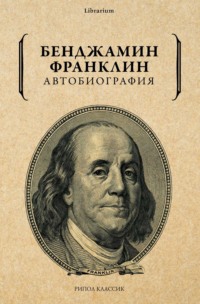
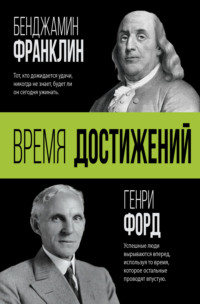
![Memoirs of Benjamin Franklin; Written by Himself. [Vol. 1 of 2]](/covers_200/24858139.jpg)
